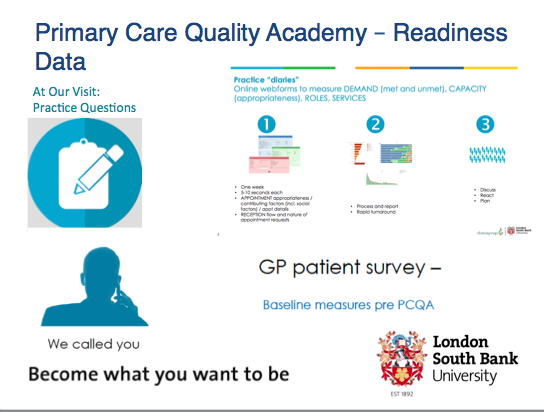
We asked some practices in a Federation to tell us what measures / indicators they collect to inform their practice decision-making in terms of how they organise (their operational management), the quality of their work, and their financial robustness. This is what they told us.
What surprised us is how little overlap there was in terms of what each practice used regularly. The range of measurement used was wide, but there was little consistency across different practices.
The focus of operational measurement and use of data was overwhelmingly focussed on managing the present.
Quality and safety measurement was focused on the past – i.e. the measurement created a retrospective view rather than a prospective view.
We know that you get more of what you pay attention to.
So what you measure determines what you do. The metrics that shape your decision-making are important. They relate to the sort of practice you want to be, and the difference you want to make.
This is what a group of practices told us about what they collect. It was copious, and it didn’t all add up into a comprehensive or coherent view of the practices work.


This exercise helps practices think about the data they need to be effective as a provider of care and as a business (after all, GP practices are private subcontractors to the NHS). Most of the measurement was about activity (generally managing and counting appointments), and so its no wonder this is the focus of how problems are seen, but also assumptions to where solutions lie. There was little about actual demand (need), or population health. In fact the metrics seemed to be dictated by contracts and incentive structures (namely QOF) – and not necessarily by patient need.
So where do you start as a practice?
- Be clear about your purpose. What is it you want to achieve as a practice in terms of your impact on health, the quality of your services, what sort of place your practice is to work in, and your financial viability?
- Then set out some goals for your practice – what would the above answers look like if you were doing it all well? How would you know?
- Now what metrics help you understand how you are doing now, and how robust you are for the future? Think about trends as well as static points.
- Finally how often do you need to review these metrics? Do you have a top 5 that you look at every week as it gives you a good ‘temperature test’?
Here is a basic example from a practice

Raising the bar
The above creates a predominately operational view. To move to a view that helps with the improvement of core process, you would seek to create measures and information loops that help you understand variation in process capability, variation in clinical decision making and, most fundamentally, whether or not you are genuinely meeting demand (need).
This could be seen as needing a fair bit of investment to put in place. It certainly needs a little staff time each week to pull together – so essentially it costs money to create this data driven view. My view is most practices are not ‘corner shop’ businesses any more. Turnovers of in excess of £1million and 20+staff are not uncommon. The ‘work’ of general practice is complicated and patients are becoming more dependent. Given all of this, then can practice be run without a balanced measures set, i.e. run predominantly on subjective decision-making? I suspect not.
We are keen to hear examples from practices. If you would like to share your examples on this blog do get in touch.
Nick Downham Guest Blog




